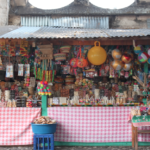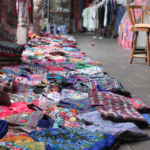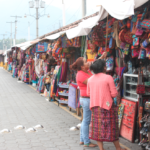Within the week that we have been in Guatemala we have been to countless markets and shops. There are people everywhere selling everything from handmade goods and produce to car parts and household items. In the United States we too have shops and stores on every corner. A common theme between both countries is that we thrive on competition. Some United States examples of this include a Shell station being placed across from a Valero station or a CVS pharmacy being placed across the street from the Walgreens. Here in Guatemala, in cities such as Antigua and Chichicastenango, this competitiveness is seen to an extreme.
In each market there are many, many stands all next to each other that will be selling similar items such as woven goods, handmade woodcarvings, and handmade beaded jewelry, all being sold for different prices. They each have an excess of these products that look almost exact to their neighbors’. This drives the vendors to extreme measures and they begin to put the hard sell on anyone that walks by or even makes eye contact. Although this may be annoying to the passerby’s, this is their livelihood and the way that they provide for their families. Many of the vendors say, “Help me pay for my family’s lunch,” or “Help me pay for coffee in the morning.” These statements definitely pull at one’s heartstrings. If at first they don’t succeed at selling an item, they often are willing to adjust their prices in order to make some sort of money for the day. Tourism and money from outside the city is what sustains their economy.
On the other hand, what about the other smaller towns, such as Chajul, that may not have tourists come through? If there are not many traveling through a town, there is no outside income, and without outside income the community’s economy will become stagnant. With the economy stagnant, the city will never be able to grow, improve, and prosper. I often wonder that if in these small towns that everyone knows everyone, how is business done and how can people make a profit? Is bartering and trading their way of life? I feel that the only way for these towns to improve is for the economy to improve and have an influx of money, but from where? Not every town can be a tourist’s paradise, especially in Guatemala where the terrain may sometimes be too rough or the roads too mangled to drive on.
Tonight, I brought up this topic during our reflection time. It was interesting to hear each of my fellow classmates’ perspectives. Overall, we realize that not all cities and not all countries can be growing and improving economically. It would most likely take the support from the government and the majority approval of the population. We came to the conclusion that the whole reason why Limited Horizons Ixil and the TAMU students are here is because we do see room for improvement and growth. There is a brighter future for the people of Chajul.



Leave a Reply